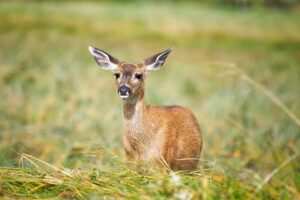PWD Cautions: Don’t Handle Wildlife, Especially Babies

It’s spring and we are all getting outdoors to enjoy the nice weather. Right now, native wildlife are beginning to get out and about, including new fawns. If you live in Texas, you may see more wildlife out and around. The Texas Parks and Wildlife Department (TPWD) urges you to leave them alone.
Birds, rabbits, deer and snakes become more active this time of year. Many people mistakingly think their young have been abandoned. TPWD experts caution against lending a helping hand and want to remind the public that it is illegal to possess wildlife in most cases.
Baby animals are sometimes picked up by well-meaning citizens. Many such human-animal encounters are unnecessary — they can even have a detrimental impact on the animal.
Fawning season begins in early to mid-May. A newborn fawn’s mottled coat hides them from predators. A doe may leave her fawn for hours at a time while browsing for food. During that time, people may spot the fawn lying alone in tall grass or in a brushy area. Many assume it has been abandoned by its mother and needs help, but this is rarely the case.
Biologists recommend leaving all young animals alone unless they are obviously injured. Spend time observing it from a distance to make the determination. Staying too close may deter the mother from returning; interfering too soon may do more harm than good.
The same principles apply to young birds out of their nests. If the bird has open eyes, feathers and can hop around, the parents are likely nearby. Grounded fledglings will usually be up and flying within a few days.
Various turtle species are also often picked up by well-meaning citizens to assist them in crossing the road. While this can be done safely, biologists say do not take them home as pets. These turtles must remain wild to stay healthy.
If a wild animal is sick or injured, TPWD encourages citizens to contact a permitted wildlife rehabilitator. TPWD staff advise the public not to handle or attempt to transport injured, sick or orphaned wildlife. Learn more about what to do upon encountering orphaned or injured wildlife, and how to contact rehabilitators on the TPWD Wildlife Division website.
Find more tips from biologists about fawns and baby birds on the TPWD YouTube channel.

Leave a Reply